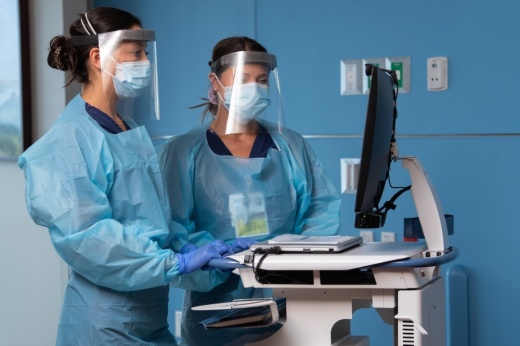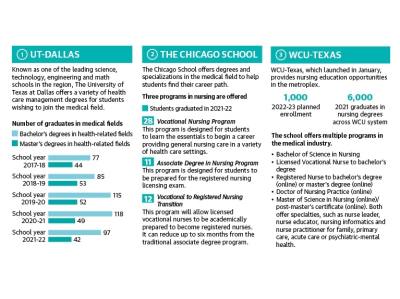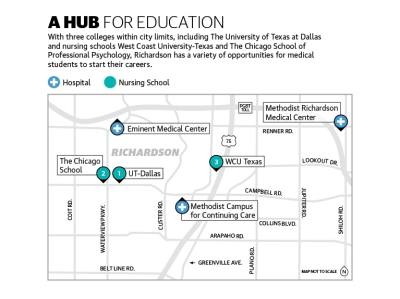Those vacancies correspond with a growing nursing shortage state officials said is happening across Texas.
Projections from the Texas Department of Health and Human Services show hospitals across the state are facing shortages of nurses and other full-time employees. The demand for full-time registered nurses is expected to grow to nearly 350,000 over the next decade, Texas projections show.
Based on these estimates, more than 16% of the open registered nurse jobs in 2032 may not be filled. That could leave the state health care industry short more than 57,000 employees.
“We’re certainly seeing a nursing shortage at this point in time,” Methodist Richardson President Ken Hutchenrider said. “There was already a shortage prior to COVID[-19], [but it] just got exacerbated with all of the patients that came in for health care at that time.”
While there was a surplus of full-time licensed vocational nurses in 2018, the projected demand will create a shortage of more than 12,500 full-time employees by 2025. Vocational nurses collect medical samples, take vital signs and more.
State data shows that shortage is expected to more than double from 2025-32.
Throughout Texas, 9% of nursing facilities reported staffing shortages at the end of March, according to data by the Kaiser Family Foundation, a nonprofit that provides nonpartisan facts on health care issues.
A beneficial partnership
Hospitals are using their partnerships with colleges and universities to help fill staffing shortages, said Candy Baptist, director of Texas Health Resources University’s career transformation center.
Hospital system employees collaborate with the schools on curriculum and learning content while offering recruitment programs for graduates, according to Baptist.
Three colleges in Richardson provide educational opportunities in the medical field: The University of Texas at Dallas, The Chicago School of Professional Psychology and West Coast University-Texas. Both The Chicago School and WCU-Texas offer a variety of nursing programs, while UT Dallas has a bachelor’s degree program and a master’s degree program for medical professionals.
The relationship between these schools and local hospitals helps facilitate health care needs, said Tonya Sawyer-McGee, dean of the college of nursing for The Chicago School.
“We have been very fortunate in that many of the facilities in which we do our clinical training also hire our graduates,” Sawyer-McGee said. “We’re helping to bridge the gap.”
To help with the staffing shortages, the Texas Health and Human Services Commission offered hiring bonuses in January of up to $5,000 for new registered nurses at state-supported living centers and state hospitals. The commission also provided up to $3,500 for eligible licensed vocational nurses and $2,500 for newly hired psychiatric nursing assistants and support professionals.
The bonus packages were part of a plan to help recruit qualified nurses and professionals back into state hospitals, according to Scott Schalchlin, deputy executive commissioner for the commission’s Health and Specialty Care System.
Meeting the need
With more than 1,600 full-time employees, Methodist Richardson officials said it is important to have relationships with area schools.
“We’re very much tied at the hip,” Hutchenrider said. “We need them to train our future nurses. They also need us to be able to have the nurses come and learn here.”
One of the biggest opportunities for colleges is the chance to provide real world training in a practical environment, WCU-Texas Executive Director Amy King said. Students at the college completed more than 131,000 clinical hours in 2021 through the school’s partnerships with hospitals and care facilities, she said.
This learning time outside of the classroom is a stepping stone to the success of students, she said.
“These [partnerships] ensure ... our clinical partners have the opportunity to hire and really identify excellent practitioners for their workforce,” King said.
For hospitals, such as Methodist Richardson, the opportunity to bring in students often leads to successful hirings once they graduate, Hutchenrider said. Over the past three years, Methodist Richardson has hired students from 11 different colleges it has partnered with, including UT-Dallas and WCU-Texas.
College recruitment
Due to the demand for nurses, Sawyer-McGee said higher learning institutions with nursing majors are working hard to recruit students.
“The [nursing] shortage has been a plus for us in helping to market the program,” she said. “We can seek students who have an interest in the health professions and know that they can go into a program where there’s some job security.”
Sawyer-McGee said members of The Chicago School’s admissions team collaborates with local high schools and other organizations to find students interested in the field.
Methodist Richardson is also trying to build interest among high school students through the use of its Health Science partnership with Richardson ISD. The program is designed to give RISD students knowledge and experience in the workforce and provide hospital mentors and internships.
Hutchenrider said he is proud of how the program shows prospective students what to expect if they pursue the field.
“We want to feed that pipeline from high school that then goes on and stays with health care,” he said. “But we also want to make sure that they know what health care is all about.”
Retention in the field
Hospitals are also working on retaining staff to grow their continued workforce, said Kelly Martin, vice president of human resources for Texas Health Resources.
“Retaining employees, especially during the taxing times we’ve experienced in the pandemic, means systems must treat employees well [and] provide opportunities for career growth and resources to help care for their physical and mental health,” Martin said.
Incredible Health is a staffing firm that partners with hospitals and health systems to help nurses get hired. It analyzed data from more than 400,000 nurse profiles in its system and surveyed more than 2,500 registered nurses in the U.S. in February.
Data from the survey showed 34% of nurses reported it is very likely they will quit their job by the end of this year.
Of the nurses surveyed, 44% cited burnout and a high-stress environment as the reason for their desire to leave their jobs.
Methodist Richardson is trying to make a “community” of full-time employees to help with retention at the hospital, Hutchenrider said. However, industry staffing shortages are likely to last, as he said there is no quick solution.
“We’re working very collaboratively with all of the nursing schools to encourage them to open up as many slots as they can, but it’s still a long process,” Hutchenrider said. “You’re talking [about] three to four years to get them through the pipeline, and then even when they come out, they have to be put through residency.”







